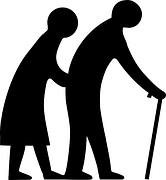A disability is any physical, sensory, or cognitive impairment that makes daily activities more difficult. Many people are born with a disability. Others acquire a disability later in life, from an accident, an illness, or the aging process. Many older individuals are diagnosed with chronic conditions that lead to functional or cognitive disabilities. Pacific Mobility Center specializes in products that give those with disabilities freedom and independence.
Over a billion people globally have some form of disability: 360 million people worldwide have moderate to profound hearing loss; 285 million people are visually impaired (39 million of whom are blind) and 75 million people need a wheelchair (of which, only 5-15 percent actually have access to one).
In recent decades, new and innovative technologies have helped lower the barriers that people with disabilities encounter in their daily lives, helping them with tasks that able-bodied people take more or less for granted, such as speaking, travelling, reading, and writing. These new technologies can be classified as assistive, adaptive, or accessible.

Assistive technology is technology designed specifically to improve a disabled person’s functional capabilities, and includes a wide range of devices and services, including IT-enabled prosthetics and implants, custom computer interfaces, and accessible communication tools. Adaptive technology provides a mechanism that allows people with disabilities to use technology that would otherwise be inaccessible to them. Text-to-speech technology, for example, helps users with vision impairments to be able to “read” materials that are written. Computer screen readers and screen magnifiers help make computer output accessible for visually impaired users. Accessible technology helps remove barriers and make the world more accessible for people with disabilities. Speech recognition software, for example, has many uses such as dictation or automated telephone systems; however, the technology can also provide independence for quadriplegics by allowing them to control a computer with their voice. Consumer Electronics Shows annually feature these types of products.
While there remains a long way to go before all new technologies are made accessible to people with disabilities, in recent years there has been a great deal of progress. Mainstream technologies are becoming increasingly adaptable, and specialist technologies have, in many cases. become increasingly affordable.
Some examples of innovative new products that further help disabled people function more easily, while acquiring more independence, include:
• Dot: the world’s first Braille smartwatch
• Talkitt: an innovative application that translates unintelligible pronunciation into understandable speech
• The Sesame Phone: designed to be used with small head movements, tracked by its front-facing camera
• Uni: a tool that detects hand and finger gestures that it converts into text
• The Finger Reader: a wearable tool that can scan a text and give real-time audio feedback of the words it detects
• Be My Eyes: an application that connects blind people with volunteers from around the world who can help with simple tasks
• AXS map: an app that carries information about wheelchair-accessible ramps and restrooms in public places
• Transcence: an app that converts spoken words into text in real time for group messaging
• Liftware: a self-stabilizing handle on which one can attach an eating utensil like a fork or spoon for patients who suffer from Parkinson’s disease or other forms of motion disorders that causes hand tremors.
Some other new and/or emerging technologies include:
• Driverless cars
• Smart glasses that include facial recognition software which interprets facial expressions and tells the wearer how the person in front of them is feeling. This could be particularly useful for people Asperger’s Syndrome, for instance, who struggle to interpret facial expressions unassisted
• Prosthetic limbs that allow wearers to “feel” touched objects, while offering better control and efficiency
• All terrain wheelchairs, capable of scaling uneven surfaces
• Smart belts that can detect when a person is falling in order to deploy air cushions prior to impact
• Medical exoskeletons which can be used to assist people who have trouble walking
• Smart canes that can alert a user’s relative is there is any unusual use or movements of the cane
Contact Pacific Mobility Center with any questions about how you and/or your loved ones can benefit from the best accessibility products available today: Stairlifts, Residential Porch Lifts, Vehicle Lifts, Ceiling Lifts, Shower Buddy, Electric Door Opener, Ramps, Scooters, Lift Chairs, Wheel Chairs, Power Electric Wheel Chairs, Walkers, Turning Automotive Seats, Automotive Hand Controls, Pool Lifts and Other Aids to Daily Living.
President, Husband, Father, Grandfather Graduate of UC Davis- Bio Sci Major- Go Aggies! Jeff has extensive experience in all of Pacific Mobility’s products and services, and specializes in accessibility products as well as stairlifts, ceiling lifts and custom wheel chairs. His hobbies include spending time with family, gardening, mountain biking, exercising and off road motorcycle riding.
24 years as Owner/President of Pacific Mobility Center – selling, installing, and servicing stairlifts, porch lifts, ceiling lifts, pool lifts, handicap ramping, specialty wheelchairs, scooters, power wheel chairs, and other power mobility devices
Certified Environmental Access Consultant since 2008
Licensed General Contractor since 1998
Certified Aging in Place Specialist since 2016
Board Member for Home Access Professionals
Member of Association of Members of the Accessibility Equipment Industry (AEMA)




